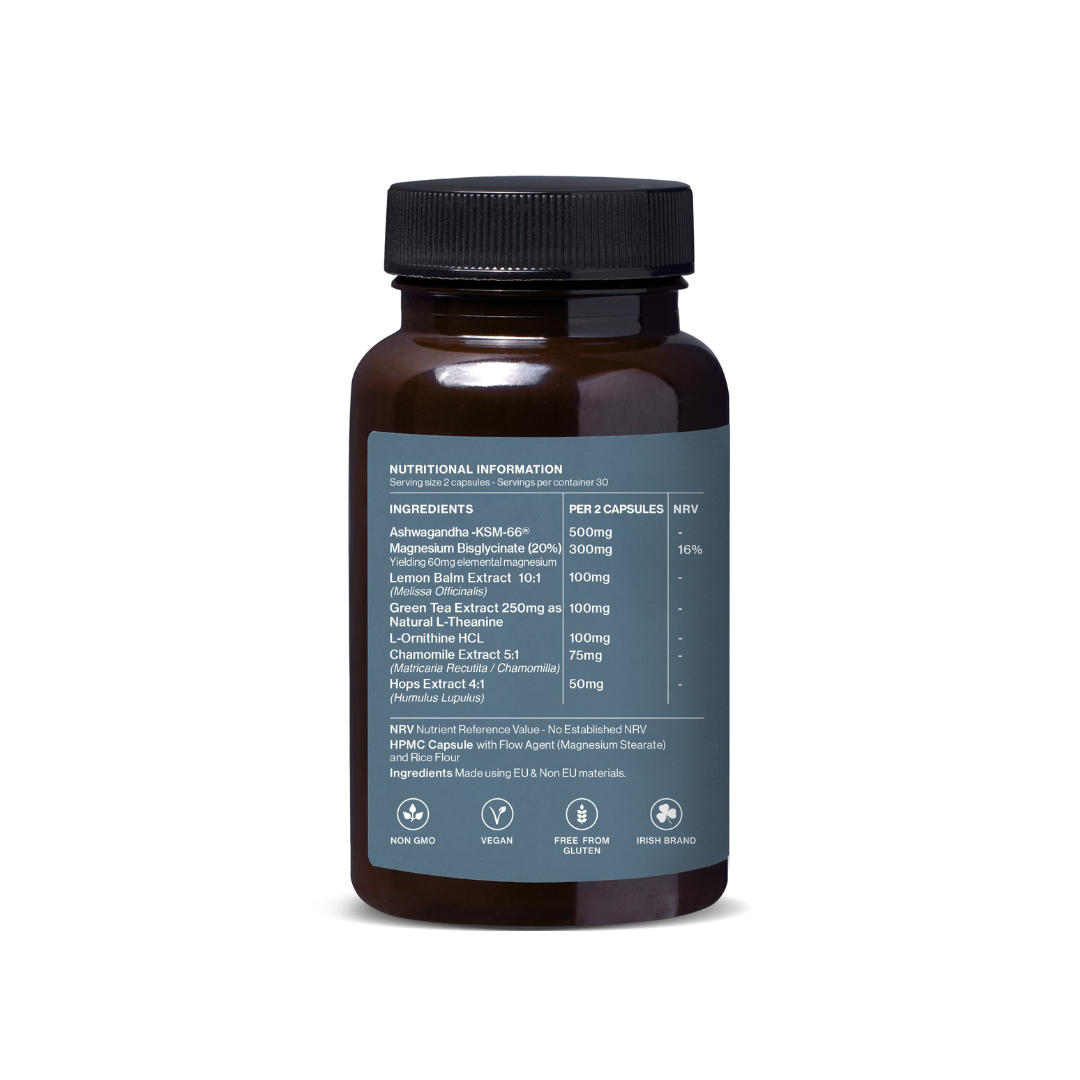Magnesium plays a significant role in our body's biological processes. It's a macro-mineral, meaning we require it in large quantities for optimal health. However, despite its importance, magnesium deficiency is often overlooked, particularly among women. This blog aims to shed light on the importance of magnesium, its role in our bodies, and why it's crucial to maintain an adequate supply for overall health and wellbeing.
Understanding the importance of magnesium is the first step towards ensuring you're getting enough of it. This mineral is not just another component in our diet; it's an indispensable part of our body's function. Let's delve deeper into understanding magnesium and its importance.
What is Magnesium?
Magnesium is an essential mineral that plays a vital role in our body's biological processes. It is classified as a macro-mineral, which means we need it in large amounts for optimum health. This mineral is involved in more than 300 biochemical reactions in our body.
These biochemical reactions rely on magnesium to maintain regular function. They include nerve function, blood glucose control, and blood pressure regulation, amongst others.
Why Do Women Need Magnesium?
Magnesium is not just another mineral. For women, its importance cannot be overemphasised. This understated gem contributes significantly to the overall health, ensuring the body functions at its peak.
Many women undergo a multitude of physiological changes throughout their life, which can substantially affect their health. During pregnancy, for instance, the bones are under extra stress as the foetus grows. Often, calcium gets the crown for promoting bone health. However, research has shown that magnesium plays an equally important role in maintaining the strength of the bones. This is important not just for pregnant women, but also post-menopausal women who are at a higher risk of developing osteoporosis.
Also, magnesium proves to be a stress and anxiety buster! It has been found to help manage stress and anxiety effectively and keep cortisol levels and symptoms in check. For a woman juggling various roles in her everyday life, managing stress effectively is extremely crucial.
And did you know about magnesium's role in sleeping better? Well, it does help in the proper regulation of GABA, a brain chemical crucial for sleep. This not just ensures that you sleep better, but also enhances muscle relaxation and regulates your nervous system.
Clearly, the benefits of magnesium for women are immense and more than enough reasons for you to include this mineral in your diet. So ladies, are you getting enough magnesium?
Health Benefits of Magnesium for Women
Magnesium, a vital mineral, plays a significant role in women's health. Its benefits are manifold, ranging from heart health to bone strength, nervous system regulation, sleep improvement, mood enhancement, and blood pressure control:
Magnesium and Heart Health
Magnesium, a vital mineral for health, has a wide variety of benefits, particularly for women's heart health. This unsung hero of our bodily functions is crucial for the healthy functioning of our cardiovascular system.
Firstly, this miraculous mineral plays a pivotal role in our heart's health. Magnesium helps maintain a healthy heart rhythm, aids in the prevention of blood clotting, and has been acknowledged for its role in heart disease prevention. Low levels of magnesium are often observed in individuals with heart disease. Adequate intake of magnesium can guard against the onset of such diseases.
Magnesium also provides several cardiovascular benefits. It aids in reducing inflammation, lowering blood pressure, and improving blood flow, making it an essential mineral for heart health.
Magnesium for Bone Health
Magnesium plays a pivotal role in maintaining bone health and protecting against bone-related conditions. It's interesting to note that about 50-60% of the body's magnesium can be found in the bones, making it a key mineral for bone strength and stability.
According to studies, low levels of this mineral have been associated with a higher risk of osteoporosis, a condition characterised by brittle and weak bones. In a study involving individuals undergoing hemodialysis, those with the least magnesium intake experienced three times more fractures than those with a higher intake.
Additionally, a recent review of various studies linked high magnesium intake with increased bone mineral density in the hip and femoral neck, which are crucial areas susceptible to fractures. Balancing a proper intake of magnesium seems to be a promising and cost-effective measure for bone health.
While pregnancy places extra demands on a woman's bone health, a good magnesium intake can help maintain strong, healthy bones. Magnesium deficiency has also been linked to poor fetal growth in lab animals, pointing us towards the necessity of adequate magnesium intake amongst pregnant women.
So, whether we look at the need for better bone health, maintaining bone mineral density, or keeping your bones strong during pregnancy, magnesium ticks all the boxes. The benefits of magnesium when it comes to maintaining and improving bone health are well documented and substantial. With this in mind, ensuring an adequate intake of magnesium should be a priority, particularly for women.
Magnesium and the Nervous System
The role of magnesium in maintaining a robust and responsive nervous system cannot be overstated. This essential mineral functions as a vital cofactor for the seamless execution of biochemical reactions throughout the body, orchestrated by enzymes. Its importance lies in the regulation of neurotransmitters, the body's chemical couriers that ensure effective communication between the brain and the rest of the nervous system.
A deficiency in magnesium can lead to a disruption in this critical process, negatively impacting the functionality of the nervous system. Symptoms might include numbness, tingling, muscle cramps, and even seizures in more severe cases.
The health benefits of magnesium for the nervous system are evident—ensuring optimal magnesium intake can contribute greatly to maintaining a healthy and efficient nervous system. Regular consumption of foods rich in magnesium, such as leafy greens and nuts, can assist in maintaining appropriate levels within the body, supporting nerve function, and mitigating potential health issues.
Magnesium for Improved Sleep and Mood
Magnesium influences key neurotransmitters involved in sleep, confirming its role in facilitating improved rest. A strong correlation has been established between low magnesium levels and disrupted sleep patterns. For those struggling with sleep disturbances, magnesium supplementation may help in falling asleep quicker and prolonging total sleep duration.
The mineral isn't only beneficial for sleep, but it is also closely linked to mood regulation. Deficiencies in magnesium have been found to significantly increase the risk of depression and anxiety. Uplifting one's mood could be as simple as restoring healthy magnesium levels in the body. Research highlights that stress can deplete magnesium levels, further exacerbating symptoms of depression. Maintaining an adequate intake of this vital mineral could potentially mitigate stress and alleviate mood disorders.
Magnesium for Blood Pressure Regulation
Often, high blood pressure can create potential risks for heart disease and strokes, making it essential to maintain. While prescription medications are available for controlling blood pressure, research has pointed out the efficiency of natural approaches. Among them, magnesium tops the list. This mineral helps dilate your blood vessels, thus playing a significant role in preventing spasms in your heart muscle and blood vessel walls.
A 2021 review associates supplementing with a dose of 300mg or more of magnesium daily for at least 12 weeks with a substantial drop in both systolic and diastolic blood pressure, especially in participants with type 2 diabetes. This natural method exhibits potential promise for those combating hypertension.
Magnesium for PMS and Menopause
Dealing with premenstrual syndrome (PMS) and menopause can be physically and emotionally challenging for women. Studies suggest that magnesium may help reduce the discomfort related with PMS – bloating, insomnia, leg swelling, weight gain and breast tenderness. It plays a pivotal part in balancing the hormones; hence, low levels may exacerbate these symptoms.
While transitioning to menopause, women may experience symptoms such as hot flashes and mood swings. Evidently, magnesium aids by managing the fluctuations of these hormones through this stage as well - a crucial reason why women need magnesium.
Magnesium for Anxiety and Depression
Tackling anxiety and depression can feel like a gnawing, relentless endeavour for many women. Modern research suggests, however, that magnesium may offer some respite.
As a vital mineral, magnesium plays a diverse range of roles in our body's physiology - one of which is mood regulation. A deficiency in magnesium can lead to an imbalance in the brain's neurotransmitter system which might trigger symptoms of anxiety and depression.
In fact, several studies indicate a correlation between low levels of magnesium and increased instances of depression and anxiety amongst women. This demonstrates that maintaining optimal magnesium levels can potentially reduce anxiety symptoms and fend off bouts of mood disorders.
Of course, it is not a 'cure-all' and should not replace any current therapies or medications prescribed by professionals. But integrating magnesium supplements or adding magnesium-rich foods into one's diet can serve as a promising supplementary strategy.
Magnesium and Osteoporosis
Magnesium is an essential mineral that contributes significantly to bone health. It's not just about calcium and vitamin D; magnesium plays an equally crucial role. Majority of our body's magnesium is found in our bones, making it vital in maintaining bone strength.
Research indicates a link between lower magnesium levels and a heightened risk for osteoporosis, a condition that results in weak, brittle bones. Furthermore, findings from a study involving individuals on hemodialysis treatment suggested that those with a lower intake of magnesium experienced thrice as many fractures compared with those who had a higher intake.
It's not just about preventing fractures. High magnesium intake is also associated with increased bone mineral density. Particularly, it strengthens the hip and femoral neck - two areas vulnerable to fracture. Essentially, magnesium acts as a protective shield, bolstering the strength of our bones and reducing the risk of osteoporosis.
Optimising magnesium intake could be an efficient, cost-effective preventive measure against osteoporosis. Its significance to bone health is undeniable, and it should be given due attention in any discussion about osteoporosis.
Identifying and Addressing Magnesium Deficiency
Magnesium deficiency is a common yet often overlooked health concern, particularly among women. It's crucial to identify and address this mineral deficiency promptly to maintain optimal health. Signs of deficiency may include:
- Muscle Cramps: Persistent muscle cramps can be an indication of a deficiency in magnesium, as this mineral plays a key role in nerve function and muscle relaxation.
- Fatigue and Weakness: Inadequate magnesium can leave you feeling constantly weary and lacking in strength, as this nutrient is central to energy production within the body.
- Mental Disturbance: Signs of magnesium deficiency can also manifest in mental health symptoms such as anxiety, depression, or brain fog, linked to the mineral's role in neurotransmitter regulation.
- Irregular Heartbeat: Low magnesium levels can result in erratic heart rhythms, as the mineral is vital for maintaining normal heart function.
- Bone Weakness: Lastly, persistent bone issues such as osteoporosis could signal a deficiency, as magnesium is essential to bone health.
Addressing a magnesium deficiency isn't a complex process, however, it requires careful attention. Firstly, you must aim to increase your consumption of magnesium-rich foods. These include leafy green vegetables, whole grains, and nuts. It's known that food sources provide the most bioavailable form of magnesium, hence their importance.
But dietary changes might not be enough. In such scenarios, supplementing with a magnesium supplement might be a helpful strategy. With recommended dosage ranging between 310-320mg for adult women, it's essential to monitor your intake closely. Remember, the RDI varies based on age, sex, and individual health conditions, so it's always best to consult with a healthcare professional.
Make it a habit to read food labels, paying close attention to the magnesium content. This can aid in ensuring you get enough magnesium per day. Bear in mind that the body absorbs only about 30-40% of the consumed dose of magnesium, signifying that your intake may need to be higher than the RDI.
Knowing how much magnesium to consume and when can be daunting. However, armed with these insights and commitment to self-care, it becomes much easier to manage your magnesium intake.
Magnesium: An Essential Mineral for Women's Health
Magnesium is undeniably a vital mineral for women's health. It plays an important role in numerous bodily functions, from heart health to bone strength, and even mood regulation. A deficiency in this mineral can lead to a host of health issues, making it crucial for women to ensure they get enough magnesium, whether through diet or supplementation.
Research suggests that magnesium may help reduce symptoms of premenstrual syndrome, anxiety, and depression, and even reduce the risk of osteoporosis. EQUILIBRIUM, a comprehensive wellness supplement, is formulated with magnesium bisglycinate, a highly absorbable form of magnesium. By incorporating EQUILIBRIUM into your daily routine, you can help:
- Reduce stress and anxiety: Magnesium can help calm the nervous system and promote relaxation.
- Improve sleep quality: Magnesium can help regulate sleep patterns, leading to more restful nights.
- Boost energy levels: By supporting energy production, magnesium can help combat fatigue and improve overall energy levels.
- Enhance mood: Magnesium can help alleviate mood swings and depression.
Invest in your health and well-being with EQUILIBRIUM - try it today!






















Share:
Phosphatidylserine Benefits: An In-depth Analysis
Phosphatidylserine Brain Benefits: Lifting the Fog